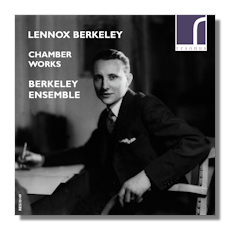
The Internet's Premier Classical Music Source
Related Links
- Berkeley Reviews
- Latest Reviews
- More Reviews
-
By Composer
-
Collections
DVD & Blu-ray
Books
Concert Reviews
Articles/Interviews
Software
Audio
Search Amazon
Recommended Links
Site News
 CD Review
CD Review
Lennox Berkeley

Chamber Works
- Piece for Flute, Clarinet & Bassoon (1929) *
- Sextet, Op. 47
- String Quartet "In Memoriam Igor Stravinsky" *
- Introduction & Allegro for Double Bass & Piano
- String Trio, Op. 19
- Three Pieces for Solo Viola
- Sonatine for Clarinet & Piano (1928) *
John Slack, clarinet
Sarah Bennington, flute
Andrew Watson, bassoon
Sophie Mather, violin
Julia Loucks, violin
Dan Shilladay, viola
Gemma Wareham, cello
Lachlan Radford, double bass
Libby Burgess, piano
Berkeley Ensemble
* World Premiere Recordings
Resonus RES10149 59:48
During his years at Oxford, where he was ostensibly studying French and Philology, as well as serving as a winning coxswain in rowing, Lennox Berkeley (1903-1989) wrote at least seventeen musical pieces. Following these years at Oxford, Berkeley spent six years in Paris studying with Nadia Boulanger to whom he was introduced by Ravel. Boulanger required him to take a year off from composing to study counterpoint and fugue in the works of Bach and Beethoven as well as works of Stravinsky.
Boulanger is well known for her devotion to the works of Stravinsky and Beethoven, as well as older composers. Thus it is no surprise that, having studied with her for so long, Berkeley's music exhibits the formal and emotional clarity and restraint I find, in my Neoclassicism in America: Voices of Clarity and Restraint, characteristic of neoclassical aesthetics. And, although this is not the only kind of music I gravitate to, it is not surprising that I like and admire the music of Lennox Berkeley.
The chamber works on this recording are, without exception, fresh and appealing. They are harmonically tonal and melodically inventive. They can hold the listener's attention even with such minimal forces as a solo viola and a double bass and piano duo. The outstandingly good sound coming from the clarinet and the French horn in the Sextet and Piece for Flute, Clarinet & Bassoon contributes considerably to the appeal of these works for me The string trio and string quartet (In Memoriam) never sound dull or routine either.
There is a Largo, two Lentos and an Adagio among the movements in these pieces, and music at that pace has to be able to sustain the listener's attention. All of these all do. Interestingly, the Lento in the earliest of these pieces, the Sonatine, sounds a tread suitable for a funeral procession, for some reason unknown to me and unexplained in the extensive notes accompanying this disc, by Berkeley's biographer Tony Scotland.
Highly recommended.
Copyright © 2015, R. James Tobin




















